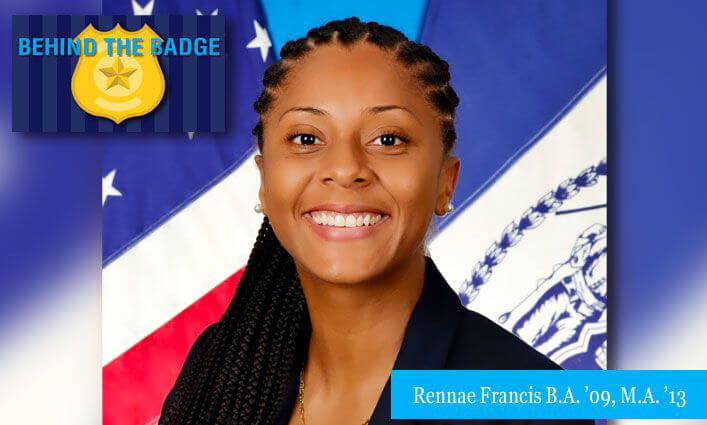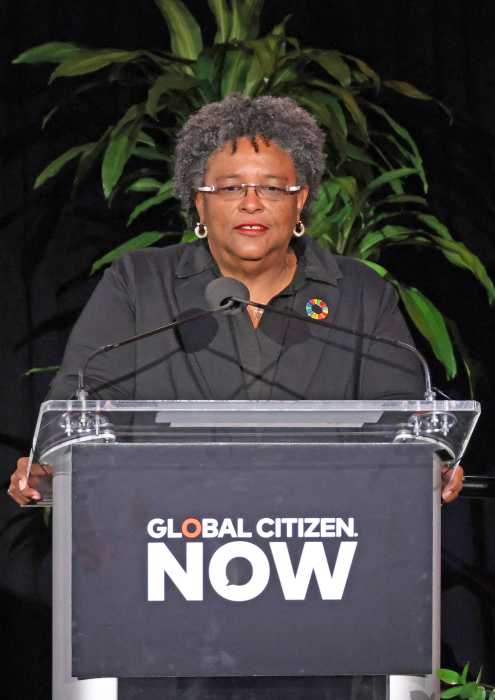Dominican-born Rennae Francis is making an impressive impact serving in the NYPD as a lieutenant commander of the Detective Squad of the 46th Precinct, in the Bronx, after joining the police cadet in 2007 while studying at John Jay College of Criminal Justice.
Francis, the first woman, and first Black woman to hold this rank, during an interview with Derrice Dean, host of Carib Nation.com, spoke of breaking down barriers after arriving in the United States alone at the age of 17, to study forensic science.
“I grew up in Dominica from birth to age of 17 and so I went through elementary school primary school as we call it high school and you know when you start your teens in Dominica it is different than in America, you’re really in the thick of things, by that time you’re getting ready for CXC and then you go on to a two-year college, or the University of the West Indies, so I had to start thinking of what I was going do with my life,” noted Francis.
“I used to love watching crime shows like CSI and Investigation Discovery, and told young herself, “this is what I should study, she said, noting that education in her household was top priority, and shared that her mother who had graduated from the university of the West Indies with a degree in History inspired her to enroll in John Jay,” which she did in 2005.
“Initially, I had zero interest in being a cop. I was good at science. I loved physics and chemistry. So, I decided to major in Forensic Science,” Francis recalls. “Then I walked past an NYPD cadet corps recruiting table and everything changed.” At the time, Francis was juggling two jobs while earning her degree—including some very challenging lab requirements. She needed a better paying job than working in retail, and she needed the job to have flexible hours so that she could fit in the lab work.
“I was an immigrant from a small island, and I had no money. I didn’t even have furniture in my apartment. It was bad,” says Francis. “The recruiter explained that I wasn’t going to be a cop, but a cadet, which is an admin position. He said that I could make my own schedule and be paid $15 an hour. At the time I was making $7 an hour at Radio Shack, according to the college website.
Asked what it is like to be a PO as a young woman, Francis responded. “I started out in patrol in the Intelligence Bureau. A black woman on patrol is difficult especially when you are patrolling a black community, people are surprised to see you in a profession that they have had so much distress with over their lives, that is why I continue to do my job.
“It’s very challenging when you’re young, female, and an immigrant. It’s challenging because you don’t fit into the boys’ club. I don’t watch hockey and American sports. Most people have similarities, that’s how they fit into the pack, but it’s okay to be an anomaly.”
She explained that the challenge was trying to gain respect from people, but not lose myself in the process.
“Cops are big on earning respect. I knew once I showed them that I was competent and that my main goal was to protect them and support them—which is what a supervisor should be—they’d respect me. The first four months were tough, with them questioning if I was qualified, but once they saw that I was good at my job, a switch went off. Now it’s like night and day.”
“I love all people, but when I see people who looks like me, I feel a connection, so when I’m on foot patrol I would talk to a lot of young people. When they see me, they assume that I would be the same, like the other PO so you I had break that barrier down.”
“I would have to say one thing though, there is a disconnect with first generation Caribbean immigrants like myself, and black Americans, who grew in American. There is a misunderstanding that it is easy for black Americans, because they can go to college for free, but my exposure and understanding of American history when I attended college, helped me to see that the system is poorly made for people of color, generally, like in New York, she said, adding that the system is made to break people down and make it difficult for them to be as successful as they should be.
“I never forget this story. I will tell people in America when they say why do you always go crazy over a number score and I’m like, I’ll go home with a 98 percent, and my grandmother would say what happened the two points, so it was never like good job,” she explained while growing up in Dominica.
Francis who completed her B.A. in 2009, her M.A. in 2013, and teaches as an Adjunct Professor at John Jay, is proud to be the first in this position and is amazed at her success, does not want to limit herself, as such, she is now studying to become an NYPD Captain, after serving 11 years in law enforcement.
She says as a Caribbean person “our drive is totally different when it comes to achieving and education and “yes, I think it was just because it’s also generational you know in the Caribbean you must work twice as hard because the opportunities are not as many as in America, so you’re used to working hard because you want to do well,” explained the over achiever.


























